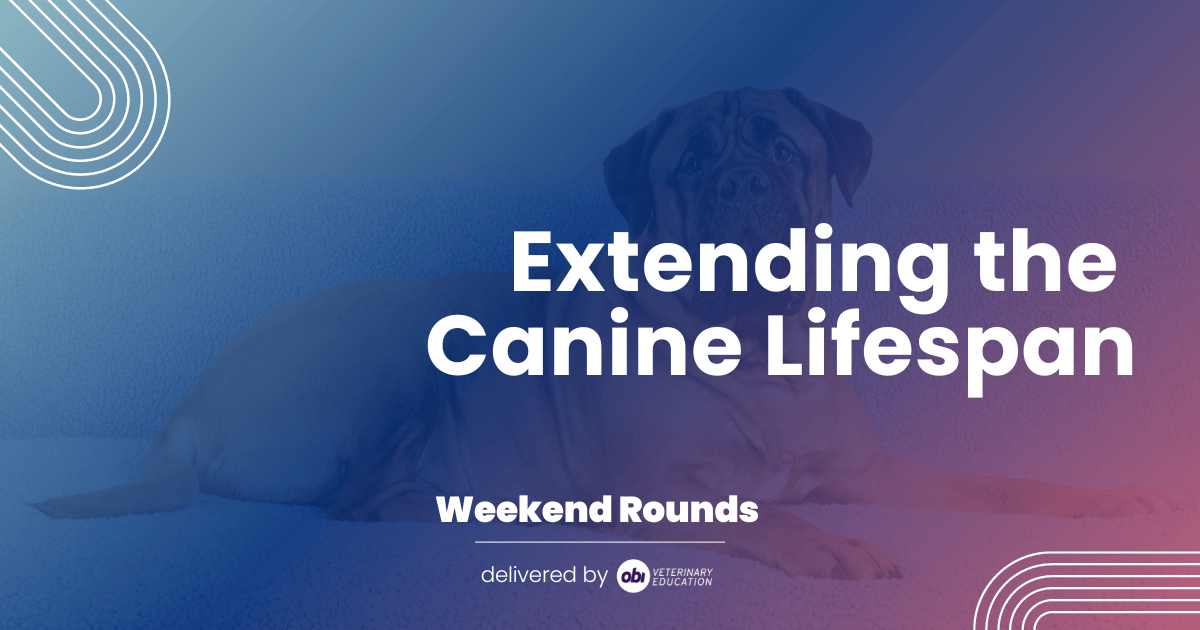Hello 👋
Welcome back to another edition of Weekend Rounds. Since last week was our 100th newsletter, that makes this one Weekends Rounds 101.
So here is some Weekend Rounds 101 for our new friends:
Weekly newsletter from Obi Veterinary Education covering the latest veterinary news, entertainment, and education.
Focused on the intersection of veterinary medicine and the wider world
The news can be depressing, but it doesn’t always need to be. We’ll only focus on the issues we know and hate like burnout, a burgeoning mental health crisis, and staff shortages only when necessary. We’ll even try to make you smile from time to time.
And although we have a full newsletter for you below, let’s be real… there is no bigger story than Taylor Swift being named Time Person of the Year and bringing her cat to the photoshoot. We are not worthy.
Here’s what else we’re covering today:
🐶 Canine life expectancy drug moves forward
💻 Obi co-founder on CBC talking AI
🎉 Congrats to our referral winners!
🤔 Who spends the most on their pets?
Don’t forget to let us know how we did at the bottom of the email so we can keep improving!
🐶 Loyal gets FDA nod
Loyal is a veterinary biotech company developing drugs intended to help dogs live longer, healthier lives. In other words they’re working on extending the life expectancy of many large breed canines. Which sounds more like a children’s fantasy that their childhood pet will live forever, and less like reality.
But their mission to let Spot live longer received some good news last week as the FDA Center for Veterinary Medicine approved the Reasonable Expectation of Effectiveness section of Loyal’s conditional approval application.
Loyal submitted approval for their drug LOY-001, and received what they believe to be the FDA’s first-ever formal acceptance that a drug can be developed and approved to extend lifespan (in any species — including humans, but more on that below).
As there was no established regulatory path for a lifespan extension drug, we had to design from scratch a scientifically strong and logistically feasible way to demonstrate efficacy of an aging drug. This process took more than four years, resulting in the 2,300+ page technical section now approved by the FDA. It included interventional studies of LOY-001 in an FDA-accepted model of canine aging and an observational (no-drug) study of 451 dogs.
So how does it work?
Selective breeding for size has caused some dogs to have highly elevated levels of the cell growth hormone IGF-1 which is effective in driving their growth when they are young, is believed to accelerate their aging and reduce their healthy lifespan when older. LOY-001 extends lifespan in part by reducing IGF-1 to levels seen in smaller-breed dogs.
The IGF-1 axis is one of the most well-studied longevity pathways. In previous studies, limiting IGF-1 has shown to extend healthy lifespan, and increasing IGF-1 shortens healthy lifespan. In people, certain centenarians have been shown to have genetically lower levels of IGF-1.
What does this mean for vets?
LOY-001 is still years away from being approved. The Reasonable Expectation of Effectiveness is just one of the many approvals needed from the FDA before clients start asking you to make their loved ones live longer. Loyal estimates that it could take two more years to receive full approval but we wouldn’t be surprised if it takes longer. But get ready — LOY-001 is administered to patients by their vet every 3-6 months.
And if you believe in their mission, Loyal is currently seeking to partner with veterinarians on clinical trials in companion animals.
What was that bit about human life expectancy?
There is preliminary evidence that suggests that a reduction in IGF-1 levels in adults can lead to longer lives in multiple species - including humans. So for Loyal’s biggest supporters, especially their financial backers, this is a step towards extending human longevity as well. By using dogs as a model of aging, Loyal is intending to impact pets and their owners.
💻 Obi co-founder on CBC talking AI
This week, Obi Veterinary Education co-founder Ryan Appleby was invited to speak about artificial intelligence in veterinary diagnostic imaging on CBC-KW Morning Edition with Craig Norris.
Let’s hear from the man himself:
AI is not only my research focus but also a strong passion of mine. It was exciting to be able to draw attention to the work, as I strongly believe that AI has an important role in improving efficiency and health outcomes in veterinary practice but that adoption of the technology should follow a scientifically rigorous process.
🎉 Congrats to our referral winners!
To celebrate our 100th edition last week, anyone who used their unique referral code to share Weekend Rounds was entered to win some great prizes.
Thank you to everyone who shared Weekend Rounds with their friends, family, and colleagues! Our winners have been contacted and will be enjoying an Amazon gift card, FIGS gift card, and a free year of CE on Obi.
Keep an eye out for more referral prizes coming soon 👀
🤔 Who spends the most on their pets?
This week, the Pet Business Professor had an incredible break down of the 2022 US Pet expenditures broken down by generation. This article is a treasure trove of data for anyone interested in the trends of spending in the US pet industry. Here are some highlights:
Americans spent $102.7 billion on companion animals in 2022.
Generation X (those born 1965-1980) spent the most on their pets at $34.43 billion
Baby Boomers (1946-1959) were right behind with $34 billion
Of the total spending over $38.69 billion is on pet food, while $29.71 billion was spent on veterinary care
Boomers account for the largest number of consumer units (essentially a household) but spend less overall (lower average CU spend) than Generation X
These trends are important to follow. As Gen X continues to grow in relation to an aging Baby Boomer populations, their spending habits may continue to trend upwards with respect to their pets which could have positive financial implications for the industry. An even more interesting trend… millennials are the only group to increase their spending every year since 2016. Overall, this points to positive trends for the growth of pet spending and veterinary medicine.


